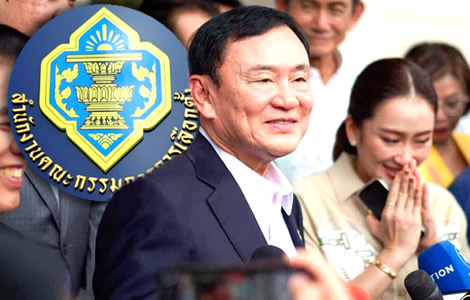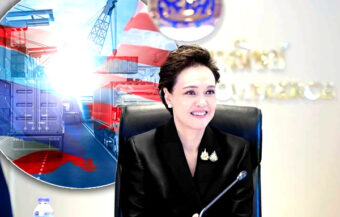Shinawatras and Pheu Thai face legal battles as the Election and Anti-Corruption Commissions probe alleged undue influence and ethics breaches. A crucial ruling Tuesday could lead to the dissolution of major parties, escalating political chaos amid fierce power struggles and mounting protests in Thailand.
It’s another day, another shockwave in Thailand’s political battlefield—triggered by the 2017 Constitution’s capacity for chaos. The latest crisis now targets the Pheu Thai-led government, former PM Thaksin Shinawatra and the Pheu Thai Party itself. On Tuesday, a critical decision could unleash a fresh political bombshell, sending the party straight to the Constitutional Court over Thaksin’s alleged grip on power. This storm traces back to August 14, 2024, at Thaksin’s Chan Song La mansion. There, a secretive meeting settled on a new prime minister candidate—Pheu Thai’s own Chaikasem Nitisiri. But the plot thickened fast. The very next day, Pheu Thai MPs in parliament put forward Prime Minister Paetongtarn Shinawatra, overturning the mansion’s deal.

The Shinawatra family encountered new political challenges on Monday—another bad day at the office of Thai politics. An Election Commission (EC) subcommittee decided to forward a major case involving former Prime Minister Thaksin Shinawatra. The case accuses him of undue influence over the Pheu Thai Party and six coalition parties. Notably, Thaksin is not a member of any party, yet he allegedly controlled their decisions.
This issue centres on a meeting at Chan Song La house. At that meeting, Thaksin proposed a candidate for prime minister. This followed the Constitutional Court’s ruling that ended Settha Thavisin’s ministerial role on August 14, 2024. Thus, Thaksin’s actions raised questions of legality and political interference.
Significantly, the decision at the meeting on August 14th, 2024, was for Pheu Thai Party nominee Chaikasem Nitisiri to assume the role of Prime Minister.
August 14 meeting decided Chaikasem Nitisiri would become PM, but faced immediate pushback from MPs
However, the next day, Pheu Thai MPs rebelled at the notion and insisted on PM Paetongtarn Shinawatra’s name being put forward for the vacant post instead. Ultimately, this may demonstrate that the fateful meeting that day was consultative. Certainly, it may also show that the power of elected MPs was not circumvented.
Moreover, the EC’s investigation committee completed its inquiry. The committee will submit findings to Saeng Boonmee, the Election Commission Secretary-General. Saeng also serves as the Political Parties Registrar. He must decide whether to send the case to the Constitutional Court. If wrongdoing is found, the Court may dissolve the Pheu Thai Party and the six coalition partners.
The legal basis comes from Section 29 of the 2017 Organic Act on Political Parties. This law forbids non-party members from directing party activities directly or indirectly. Furthermore, Section 28 prevents parties from allowing outsiders to control their affairs. Violating these rules can trigger dissolution by the Constitutional Court.
Complaints from political figures led to a lengthy investigation into allegations of undue influence
Four complainants filed the petitions. They include Dr. Warong Dechgitvigrom, president of the Thai Phakdee Party. Also involved are Mr. Ruangkrai Leekijwattana, a member of the Palang Pracharath Party, Mr. Noppharut Worachitwuttikul, and an anonymous petitioner. Therefore, the complaints come from various political corners.
The Election Commission called several political leaders for questioning. These included Anutin Charnvirakul, leader of the Bhumjaithai Party. Additionally, Santi Promphat, a core member of the Palang Pracharath Party, gave a statement. Both attended the controversial Chan Song La meeting. Their testimonies added important context for the investigation.
The investigation began in October 2024, after the registrar accepted the petitions as credible. An investigation committee was formed with a 30-day deadline, extendable if needed. Thus, the process stretched over several months. The committee’s report will soon influence Thailand’s political future.
On July 15, the committee will submit recommendations to the registrar. If it finds evidence of misconduct, the registrar will take further action. This includes reporting to the full Election Commission. The registrar may then forward the case to the Constitutional Court for a final ruling.
The National Anti-Corruption Commission opened a probe into PM Paetongtarn over controversial audio clip
Meanwhile, the National Anti-Corruption Commission (NACC) took separate action on Monday. It decided to investigate Prime Minister Paetongtarn Shinawatra over an audio clip controversy. The clip involves a conversation between Paetongtarn and Cambodian Senate President Samdech Hun Sen. The discussion concerned the Thai-Cambodian border dispute.
The NACC investigation stems from accusations of serious ethical breaches. Several senators filed the complaint, alleging violations of constitutional ethics standards. The NACC panel will assess if evidence justifies formal charges. If so, the case will be sent to a Supreme Court division specialising in political ethics.
Past rulings in similar cases have resulted in lifetime political bans. Therefore, the stakes for Paetongtarn are very high. This probe adds to her mounting legal troubles. She was already suspended from office by the Constitutional Court over the same controversy.
The leaked audio showed Paetongtarn appearing to side with Hun Sen instead of the Thai military. This caused uproar among conservative activists. Consequently, large protests demanded her removal from power. This scandal threatens the young prime minister’s political future.
Paetongtarn’s tenure since August 2024 has been rocky, with ethics probes and deputy PM acting in her place
Paetongtarn assumed office in August 2024 after Settha Thavisin’s removal. Like Paetongtarn, Thavisin faced ethics allegations. Thus, the current government has endured repeated crises. Although suspended, Paetongtarn still holds the position of Minister of Culture. Deputy Prime Minister Phumtham Wechayachai currently acts as prime minister.
Phumtham revealed that Paetongtarn might seek a two-week extension to submit her Constitutional Court defence. The original deadline was 15 days from July 1. Meanwhile, Dr. Prommin Lertsuridej, Secretary-General to the Prime Minister, said preparations are underway. However, he did not confirm if Wissanu Krea-ngam is heading the legal team.
Dr. Prommin maintained that Paetongtarn’s conversation with Hun Sen was made in good faith. He insisted the call aimed to protect national interests. Additionally, he said government agencies were consulted during the process. Notably, Hun Sen was not acting as a government representative during the call.
Dr. Prommin further stated that three witnesses were present during the conversation. They can confirm the call’s content and purpose. He also claimed Hun Sen released the audio clip improperly. Therefore, the leak misrepresented Paetongtarn’s intentions.
Former PM Thaksin defended his daughter amid rising political tensions and critical US trade negotiations
Meanwhile, former Prime Minister Thaksin remained publicly involved. He defended his daughter during a televised interview on July 9. He stressed the political pressure his daughter and the government face. Moreover, he highlighted his ongoing role in vital trade negotiations with the United States.
Thaksin’s experience is considered essential for the country’s economic interests. However, his involvement has angered conservative forces. These factions are believed to be working behind the scenes to undermine the government. They also oppose the current trade talks with the US.
Arch conservative icon Sondhi pushes anti-American sentiment against both Thaksin and the People’s Party
Election Commission dismisses strong speculation of legal action over Senate election collusion claims
The Election Commission Secretary-General’s decision on Tuesday will be critical. If the case proceeds to the Constitutional Court, it could dissolve major political parties. Such a move would create further instability in Thailand’s political landscape.
Critics argue the 2017 Constitution grants too much power to unelected agencies. They say these agencies can act against elected governments based on activist complaints. This legal framework creates uncertainty and political confusion.
Therefore, once again, the next few days will be decisive. The Election Commission and NACC’s actions could shape Thailand’s governance over the heads of the electorate. Meanwhile, the Shinawatra family is once again at the center of a turbulent political storm. The nation watches closely as further legal and political crises unfold.


















